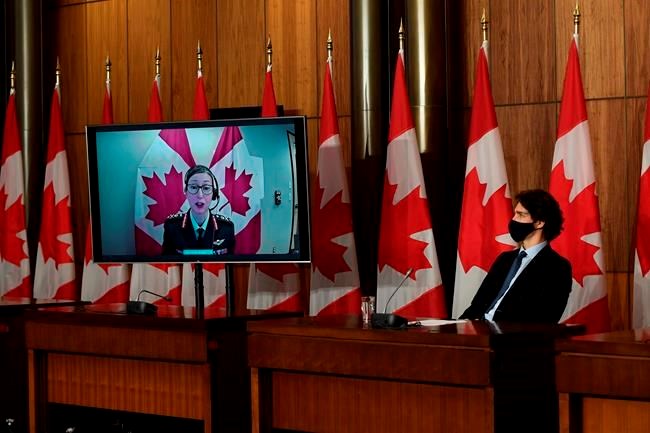OTTAWA — The military general overseeing the distribution of COVID-19 vaccines across the country says Canada is moving to a "more nuanced" approach as the supply of doses is on the verge of outstripping demand.
Brig.-Gen. Krista Brodie says more than two million doses of vaccine are already being held back because provinces have said they can't use them yet — a big change from when all newly arrived doses were shipped around the country as quickly as possible.
"In the coming weeks, we will cross a symbolic threshold of 66 million doses, signalling that there are enough doses in Canada to vaccinate every currently eligible Canadian," Brodie said at a virtual news conference from Ottawa Thursday.
"As we pivot from limited supply to sufficient supply, we are implementing a more nuanced approach to ensure that the vaccines are stewarded in a manner that best supports Canada's enduring domestic needs, as well as optimizes options for supporting global vaccination efforts."
Provinces can draw more doses from the reserved amount when and if they need to do so.
Canada's vaccination rate remains among the highest in the world, but is starting to slow as the pool of people still looking for a first or second dose shrinks.
Health Canada has not responded to a question asking how many doses of each vaccine are in that reserve or when they expire. Canada has already said it plans to donate the rest of its expected shipments of the Oxford-AstraZeneca vaccine — 17.7 million doses — to the COVAX global vaccine-sharing alliance.
Those doses will be shipped to developing countries that are nowhere close to the level of vaccination Canada now enjoys. In Africa, about three per cent of the population has now received at least one dose, and 1.4 per cent are fully vaccinated.
As of Thursday, more than 69 per cent of Canadians had at least one dose, and almost 47 per cent were fully vaccinated.
Dr. Tedros Adhanom Ghebreyesus, director-general of the World Health Organization, warned countries such as Canada, where vaccinations are high and case loads under control, to remember the pandemic is not over. On Thursday, the WHO reported the number of COVID-19 deaths in Africa jumped 43 per cent over the last week, as the Delta variant continues its devastating spread.
Several provinces indicated Thursday that they've had to destroy some doses of the Oxford-AstraZeneca vaccine that expired July 1 before it could be used. The doses had already had their expiry date extended by Health Canada for another month.
Ontario Health said Thursday it has 3,190 doses of AstraZeneca that will be destroyed, Prince Edward Island said it is destroying 3,200 doses and New Brunswick 960.
Demand for AstraZeneca plummeted in May after the National Advisory Committee on Immunization said the mRNA vaccines from Pfizer-BioNTech and Moderna were preferred because they weren't associated with the rare but serious side-effect of blood clots potentially linked to AstraZeneca.
Canada has yet to say when or if it will donate any doses of Pfizer or Moderna. Procurement Minister Anita Anand said there will be 95 million doses of the two vaccines delivered by the end of September. That is at least 20 million doses more than Canada could use even if 100 per cent of Canadians chose to get fully vaccinated.
Most polls suggest about 80 per cent of Canadians will be vaccinated. Currently vaccines aren't authorized for kids under the age of 12, with hopes vaccine trials on younger children will be finished by the end of the summer.
Intergovernmental Affairs Minister Dominic LeBlanc said Thursday Canada will keep enough doses to at least ensure supply for younger children when they become eligible. There are about 4.8 million kids in Canada under the age of 12.
"We will never do anything that will jeopardize our ability to have, quickly and safely, access to all the vaccines necessary to immunize any eligible Canadian," LeBlanc said.
Tedros has chastised wealthier countries for vaccinating children, who are at the lowest risk for serious illness from COVID-19, while vulnerable people in other countries can't get access to a vaccine.
This report by The Canadian Press was first published July 15, 2021.
Mia Rabson, The Canadian Press
